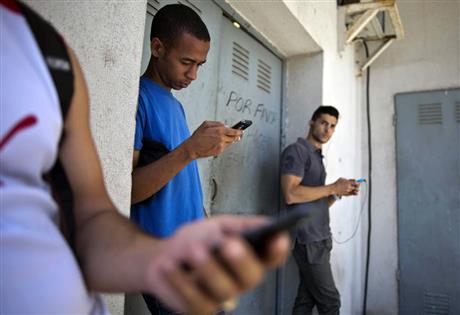
By JACK GILLUM
As U.S. officials dealt with the fallout of the government’s once-secret “Cuban Twitter” program, they had one thing on their side: notorious delays in the federal Freedom of Information Act.
The government didn’t have copies of the documents, which formed the basis of an Associated Press investigation detailing a program on which taxpayers spent millions. But officials were worried that asking the contractor to hand over copies would risk making the details even more public.
“The risk is that it gets FOIA’d later. FOIA will take six months,” said Mark Lopes, a former senior official with the U.S. Agency for International Development. “I say yes so we get through the next week, six months from now when FOIA comes out, this will all be over?”
USAID’s calculus — realizing that the nation’s public-records law can be so slow as to border on unusable — comes amid new data showing that delays to process requests from the public or journalists worsened under the Obama administration. Last year, the government also set a record for coming up short in finding documents.
Sponsored Links
The Best Springfield Breakfast Spots To Start Your Day
Springfield, MO
What Your Brand Color Says About Your Business. (Infographic)
Staples
The government’s responsiveness under FOIA is widely regarded as a barometer of its openness. President Barack Obama has said his administration is the most transparent in history.
In USAID’s case, emails released last week to the AP come two years after the news cooperative asked for them following its 2014 report of a secret Twitter-like program in Cuba. ZunZuneo, as it was called, was among several Cuban civil-society programs designed to bring about democratic change.
The programs have received sharp criticism from some U.S. lawmakers, who called them “reckless,” ”boneheaded” and “downright irresponsible.” The AP found that some Cubans unwittingly ensnared in the program were detained by Cuban authorities, and a secret U.S. hip-hop operation backfired after Cuban authorities found that an independent music festival was really backed by the Obama administration.
USAID spokesman Ben Edwards said the agency was “committed to openness and transparency, and we take our obligation to release information under FOIA very seriously,” adding that delayed responses came from a “significant increase” in information that requestors sought.
The newly released documents, showing the back-and-forth among USAID officials trying to respond to the ZunZuneo revelation, contain dozens of redactions largely for personal-privacy reasons. But most censored items appeared to be benign bits of information like officials’ email addresses and general narratives that, at times, describe journalists.
“Um, this could be worse. (Redacted lines) this Jack Gillum guy, and unfortunately, Desmond Butler, who has written extensively and unfavorably on crappy USG programming in Cuba in the past,” wrote one former official, Joseph McSpedon, referring to this reporter and Butler, who’s covered U.S. government programs there.
Under the president’s instructions, the U.S. should not withhold or censor government files merely because they might be embarrassing. USAID cited privacy exemptions in 82 requests last year, and that was the exception cited most often.
The AP previously obtained thousands of leaked internal documents about the Cuba program, run by Washington-based private contractor Creative Associates International. A December 2015 inspector general’s report found the program was inadequately monitored and had conflicts of interest.
A USAID lawyer acknowledged in the emails the risk in obtaining those very documents from Creative Associates. If the government had possession of them, she said, they could become public record.
“Mark is correct that any copies or notes would be subject to FOIA,” wrote Susan Pascocello, the agency’s deputy general counsel. “It would be a good idea for me or Hal to speak with the person who is going to Creative so that we can provide guidance.”
Overall, USAID said it took nearly 11 months last year to process FOIA requests that were deemed “complex” — when a request asks for a lot of documents or requires government workers to search multiple places. The agency processed 305 FOIA requests that same year.
Under FOIA, citizens and foreigners can compel the U.S. government to turn over copies of federal records for little or no cost. Anyone who seeks information through the law is generally supposed to get it unless disclosure would hurt national security, violate personal privacy or expose certain confidential decision-making.
Yet in one newly released USAID message, one government official’s friend suggested FOIA was the source of the ZunZuneo documents and should be tightened up: “AP didn’t get this through FOIA, did they? If so, maybe it’s time to hire some new redactors. They got a bit too much of an inside view.”
The sender’s name and email were censored.



